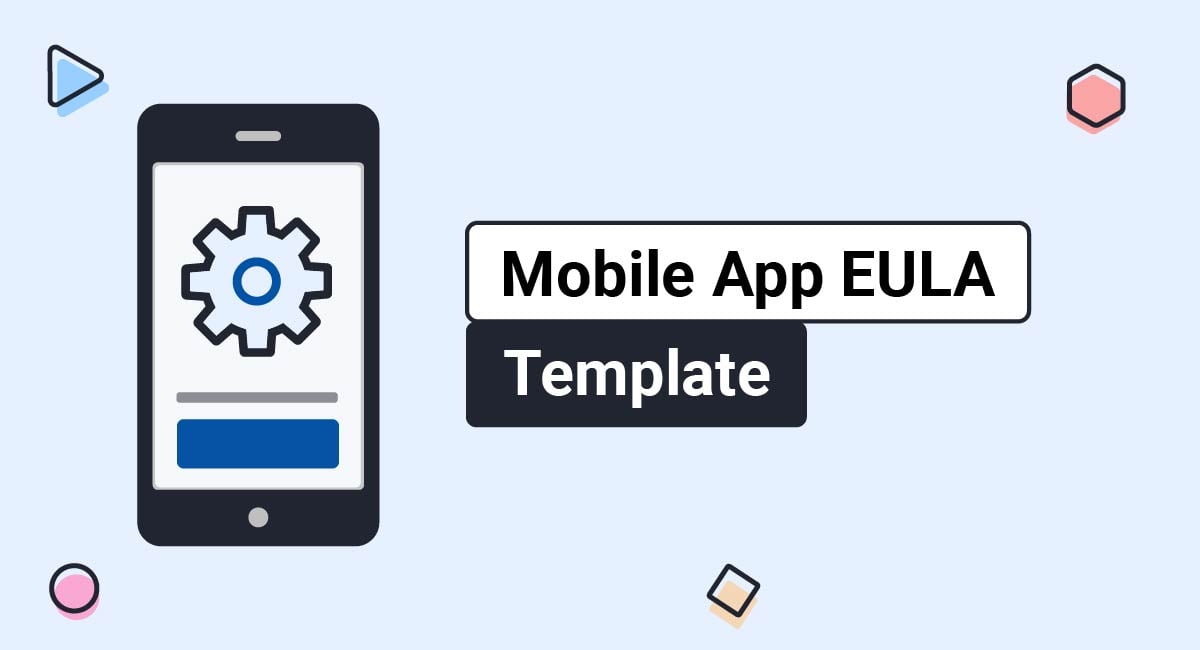

An End User License Agreement, commonly referred to as an EULA, is a crucially important part of any mobile app.
In brief, an EULA is the contract between the mobile app user and the software developer who provides the app. It works to distribute a license to the user of the app and lays out the terms of the use of that license.
This article will discuss the benefits of having an EULA for your mobile app, what the most important clauses are, and how you can create and display your own.
Our EULA Generator makes it easy to create an EULA. Just follow these steps:
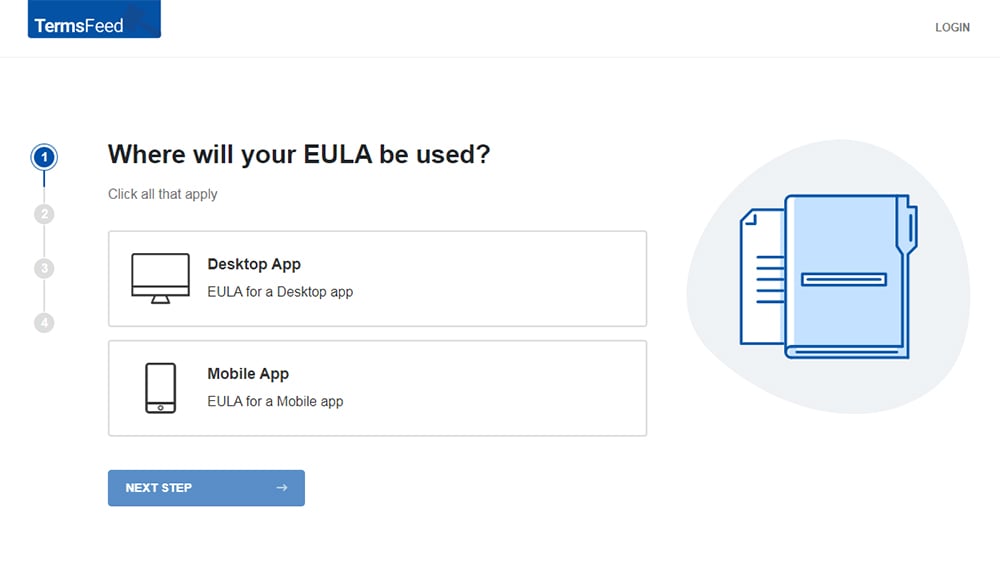
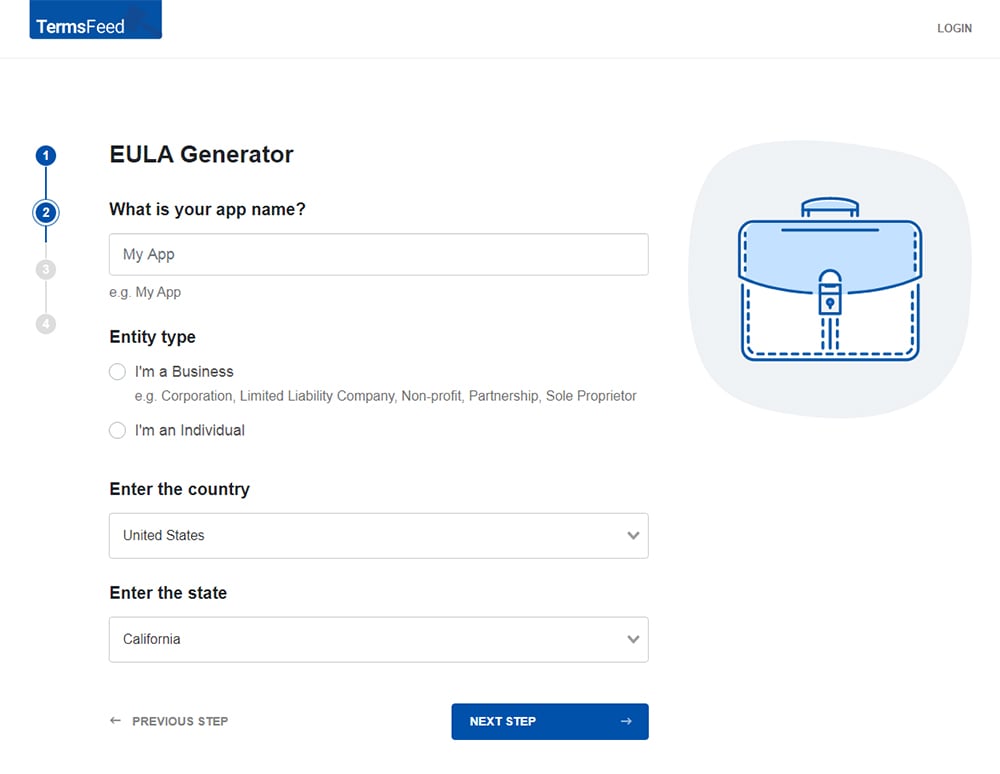
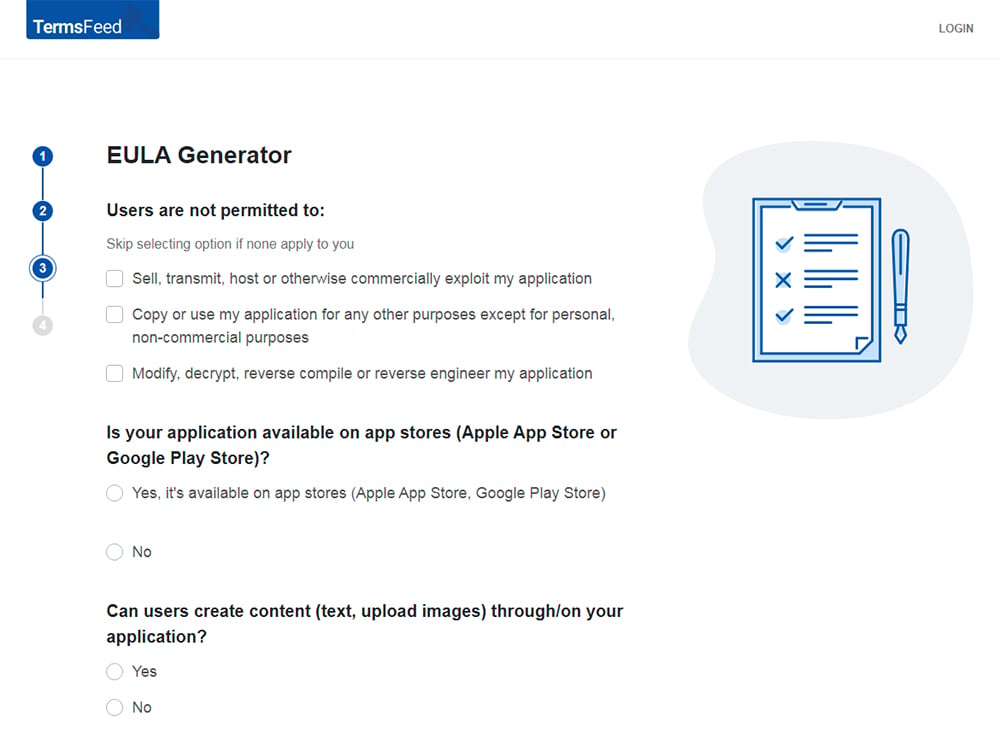
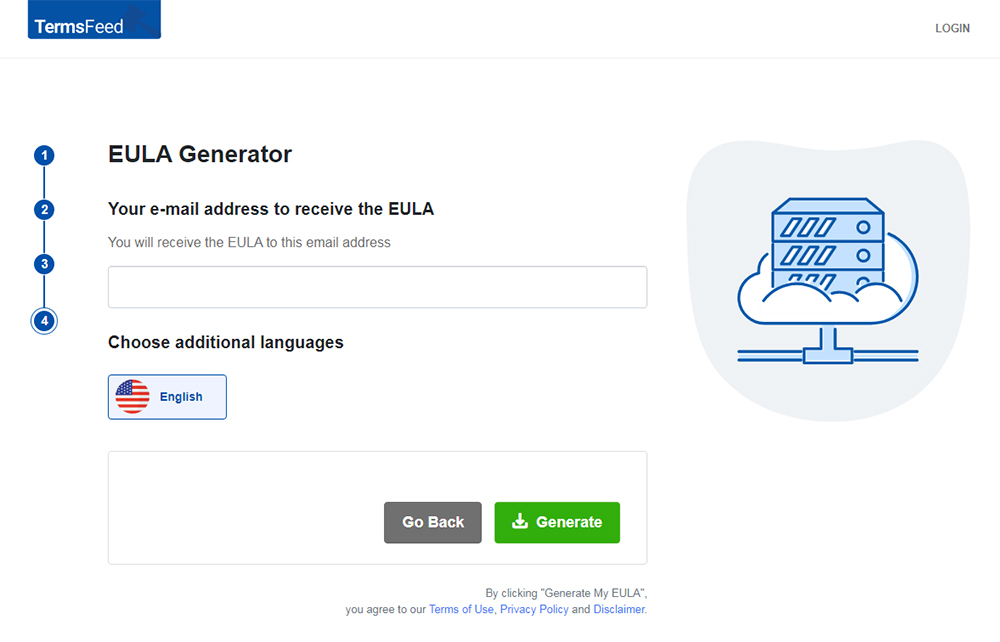 You'll be able to instantly access and download your new EULA.
You'll be able to instantly access and download your new EULA.End User Licensing Agreements are an important thing for businesses and their users alike for a number of reasons.
These agreements are part of the process of users downloading and installing a mobile app. Because a license to use the app is passed on to the user, the license can include limitations such as prohibiting a user of the app from trying to reverse-engineer the app or reselling the app. The EULA is where these limitations will be described.
EULAs also work to protect the business owner's liability in cases where the license may temporarily be inaccessible, or other non-ideal situations that may arise.

There are a number of clauses that should be included in every EULA.
Let's take a look at some important mobile app EULA clauses in detail, with examples.
The key purpose of your EULA is to grant a license to a user. You can start your mobile app EULA by declaring this, and by stating the scope of the license.
Here's how RustyBrick declares that it grants the end user a "limited and non-exclusive right" to use the license and app "only for the purposes described in the agreement:"

Opera includes more details in the title of its short clause, letting users know simply from the title that they are only granted a limited license:

Some businesses make this clause very short and to the point, like above. However, others use this clause to include what we'll be covering in the next section - Restrictions or limitations on the use of that license.
Here's how Blurb has created its License clause to both grant the license and get into details about the restrictions on its use:
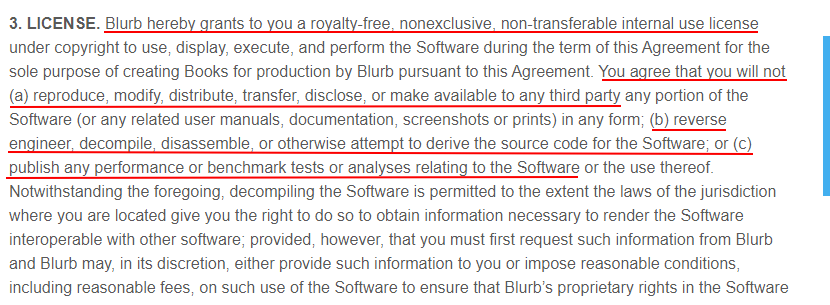
While going with either style is ok, it may help with readability to split up these clauses so readers can more easily find what your restrictions are. Let's take a look at some clauses that specifically address this.
When you allow a user to download, access, and use your mobile app, this must come with some sort of restrictions and limitations.
A clause that addresses restrictions on use is where you make it clear what types of things are forbidden (or not), such as limiting the amount of installations per license, forbidding using the app for generating a profit or attempting to decrypt the app. This clause can have any number of names, but it will always contain information on how an app and/or the license is not to be used.
Here's an example of a clause from Smartsheet's Mobile App EULA that broadly addresses the issue of acceptable use:

Another way to address restrictions on use of your license is to dictate the scope of your mobile app license like Steelcase does here:
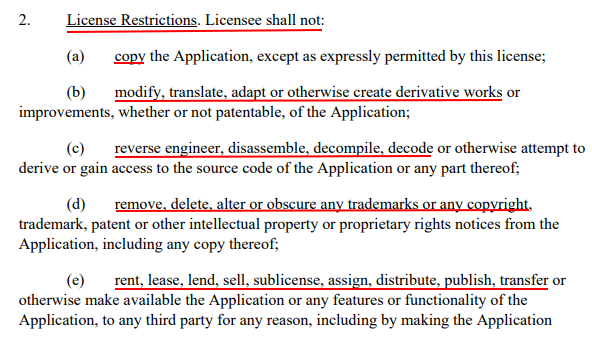
When you grant a license to someone to use your mobile app, you will want to maintain the ability to revoke that license of use if a user violates your terms.
Common violations that would make you wish to revoke a license are when a user is abusing your app, attempting to decrypt your app, violating copyright limitations, and taking other restricted actions.
Since the EULA grants a license to use the app, it should also include a clause to take away that right to use under certain circumstances.
The current trend with this kind of legal agreements and their termination clauses is to keep them general and keep power in the hand of the developer/provider of the app.
Here's an example from Viber of how this type of clause is usually constructed. It lets users know how they can termination their own accounts, while also reserving the company's right to terminate accounts at any time, for any reason:
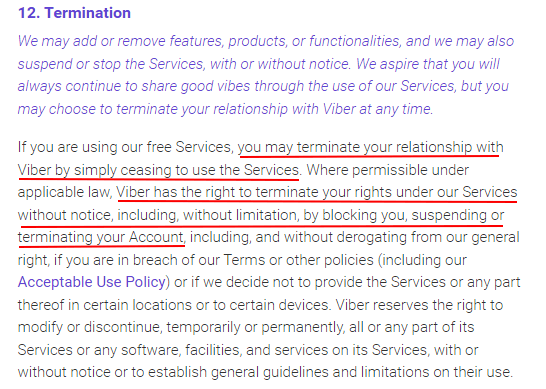 Terms of Service: Termination clause" width="546" height="389" />
Terms of Service: Termination clause" width="546" height="389" />
Smartsheet has a shorter clause, but it still works to get across the same important points while reserving the company's right to terminate or suspend accounts:

It's important for developers to make it clear in an EULA that they, the developers or the company that owns the app, will not be held liable for any damages that arise from the use of the licensed app.
This can be done with asimple disclaimer, commonly called a Limitation of Liability disclaimer, such as the one below:

If your app has an ecommerce portion where you sell items, or if your app itself is a for-purchase commodity that offers a mobile service, you should have a Disclaimer of Warranties clause as well.
This is where you will disclaim warranties on your app or the goods you sell to the extent allowed by law. This will help protect your legal liability and your business.
Here's how Smartsheet puts users on notice of its disclaiming of warranties for its mobile app:

These clauses almost always look very similar, with all-caps lettering and heavy legalese language.
This clause is where you will declare to the users that you retain rights in your content, and that giving the user a license to use the product does not affect your right of ownership. You can also address any third party content and even user-generated content if your app allows such content.
Here's how RustyBrick addresses this topic in its Mobile App EULA:

Blurb uses its "Title" clause to address that it retains rights in its software and IP, while users retain ownership rights in all the content they submit:

This clause will differ depending on your specific business model. Just make sure you address any rights that you are retaining, as well as any rights that your users will retain.
Because privacy is such an important aspect of the relationship between you and your users, it's a good idea to make note of your Privacy Policy via your app's EULA.
All you really need to do here is mention that you in fact have a Privacy Policy, and link to it so users can learn more if they wish.
Here's how RustyBrick does this in a short, to-the-point clause:

If you wish to go into some additional detail here, you can, but know that it isn't necessary. For example, Smartsheet notes that it collects certain personal information via its app and then uses a third party service that collects and analyzes the data. It then links to its full Privacy Policy:

As your business grows or changes, it's inevitable that you may need or want to update your EULA to reflect the changes. It's important that you reserve this right while letting users know that changes or updates may happen.
If you will alert people of any material changes, note this and what method you will use.
Here's how Smartsheet reserves the right to modify its EULA, while linking to the most current version. Users are told that they will receive notification via the mobile app of any material changes to the agreement:

It's important that you let users know what laws and jurisdiction will govern your agreement. You should choose the laws and region that your business has direct relations to, and that have laws that would provide the most benefits for you.
Here's how Steelcase announces its governing law as well as which courts will have jurisdiction if a legal suit arises under the agreement:

If you provide customer support for your mobile app, you can make it known in your app's EULA. Likewise, if you don't offer customer support, it's a good idea to disclose this here. Otherwise, users may expect you to provide them with assistance and become unhappy if you don't.
Smartsheet includes a clause like this that makes it known that while it may provide maintenance or support for its mobile app, it is under no obligation to do so:

Finally, your mobile app EULA should include at least one method for users to contact you with questions about the app or the agreement. This can be an email address, phone number, contact form or other convenient method.
Viber offers an in-app method, a website method and a mail-in method:
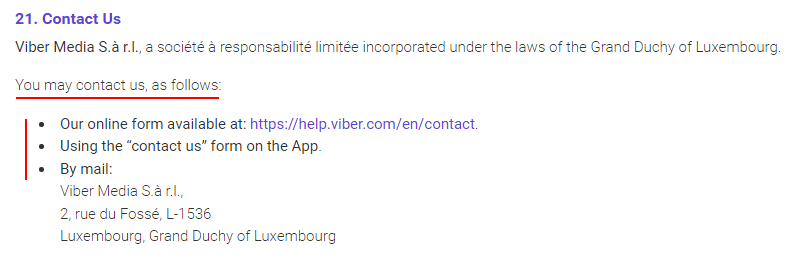 Terms of Service: Contact Us clause" width="795" height="268" />
Terms of Service: Contact Us clause" width="795" height="268" />
While not a standard clause, RustyBrick includes this useful form at the bottom of its EULA that includes a range of ways to contact the company, from social media accounts to a fax number to a physical storefront address:
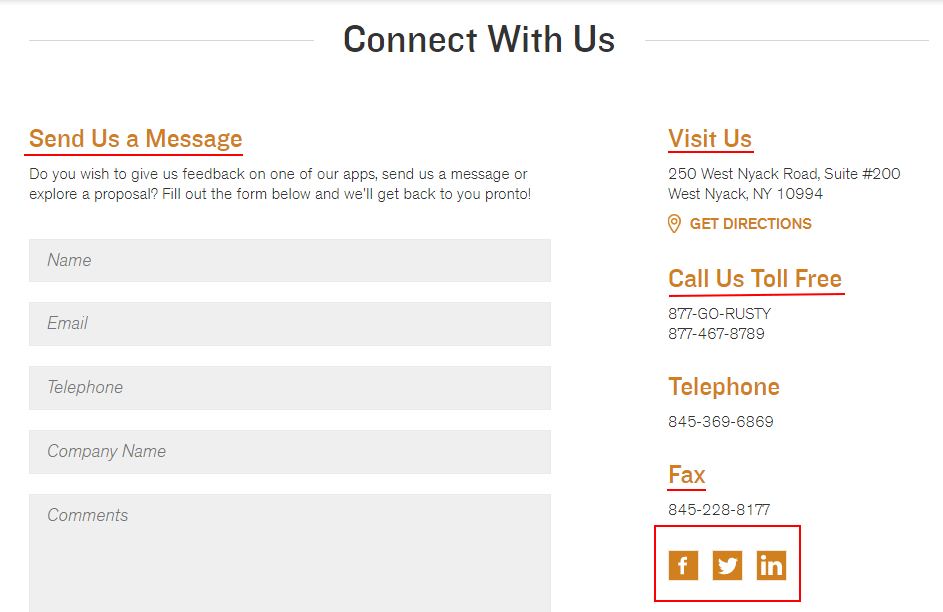
Now that you have an idea of what content to put into your mobile app's EULA, let's take a look at how you can display it to the public when it's ready to go.

Your EULA should be available to users both before and after downloading/installing your mobile app.
This is because people need to be able to see what your terms are before downloading your app and becoming a party to the agreement by doing so. The EULA should also be accessible after download so that at any time during the relationship between you and your users, the user can check to see what your license agreement terms are.
Mobile app stores will display a link to license agreements, as you can see here in the Adobe Fresco app's Apple App Store listing:
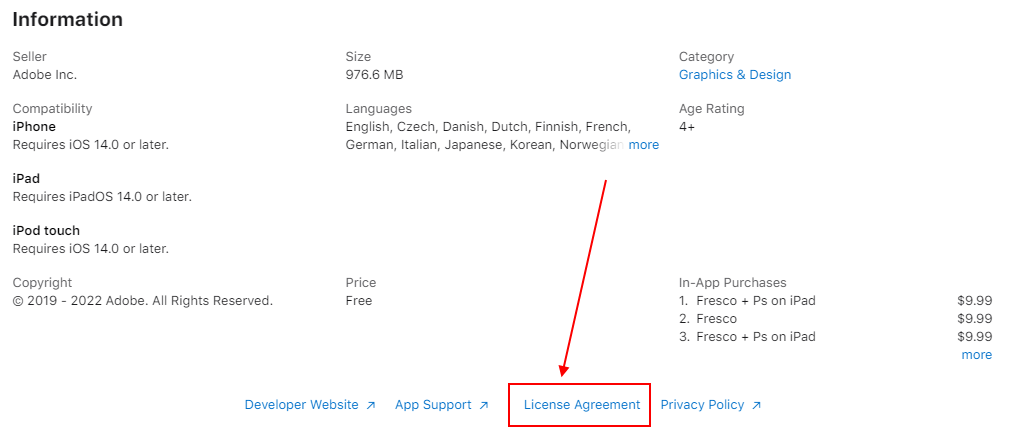
When it comes to displaying your app's EULA after the app is downloaded, the method is simple. Your EULA should be displayed the same way as your other legal agreements are, via an in-app menu.
Simply include a "Settings," "About" or "Legal" type of menu in your app and link or embed the licensing agreement (and other legal agreements) within the menu.
Here's how the Fitbit iOS mobile app has a "Legal" tab within its "Account" screen where all legal agreements are placed and easily accessed:
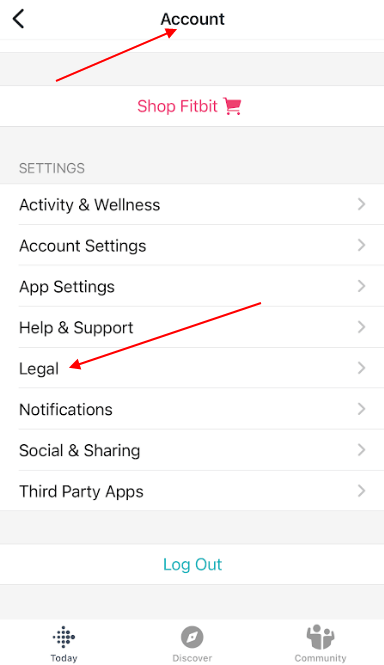
You can also include a footer-style link in your mobile app to help draw more attention to your EULA and other legal agreements, like PayPal's iOS app has done here:
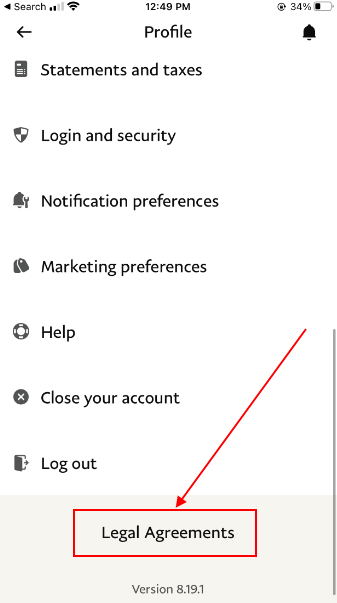
When the user taps on the "Legal Agreements" link, a new screen opens with a list of tappable legal agreements, including the License Agreement:
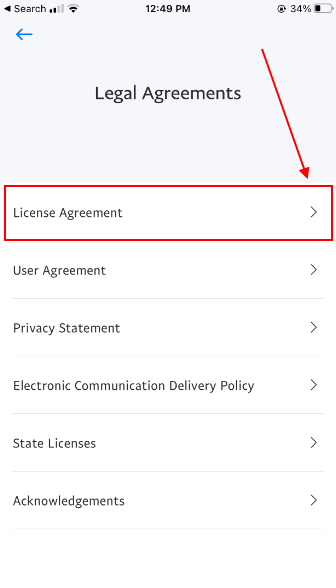
The Mobile App License Agreement opens directly within the app for easy, any-time viewing from directly within the app itself:
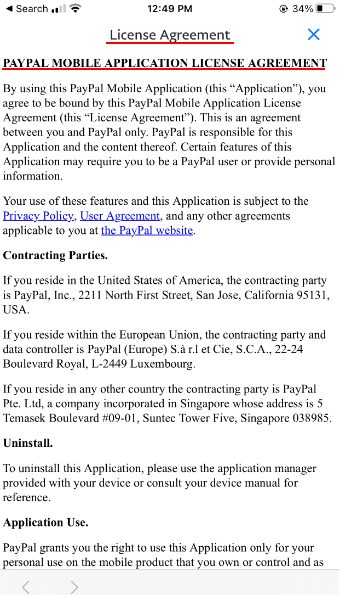

In brief, an EULA deals with granting a license, while a Terms and Conditions agreement deals with rules on how you use a website/service.
EULAs and Terms and Conditions agreements might seem like they're the same, but in fact they are very different. There are instances where you will want to use just one or the other, and instances where having both would be best.
Instances when you'll only want an EULA agreement are not very common these days. However, if you are providing a license to an app that doesn't access the web and just functions locally on the user's mobile device, such as a one-time purchase of a desktop app software program, this kind of licensing agreement will suffice and you will not need a Terms and Conditions agreement.
On the opposite end of the spectrum, if you are offering users access to a web-based service or mobile access point like Dropbox does, you'll not need a licensing agreement, but a Terms and Conditions agreement. This is because you are not granting a license to users, but simply allowing them to use your service through the app.
In the middle lies mobile apps that have both licensing and service components, such as a desktop or mobile app that's purchased only once (the user is then licensed to use the app), but another section of the app or an upgrade comes with a web subscription plan or has a web-based component to the original software.
These cases usually require both a licensing agreement for the original app, as well as a Terms and Conditions agreement for dictating how a user will be expected to use the portion of the app that uses the web service component.
If your mobile app grants limited license use to people who download and use it, you'll need to have an End User License Agreement, or EULA.
This EULA is where you'll cover important points such as:
After you have your EULA created, make sure you display it publicly both before users download your app, as well as within your app itself. Do this by making your EULA available via whatever app store listings your app is available at, and within some sort of in-app menu, such as a "Legal" menu.
Comply with the law with our agreements, policies, and consent banners. Everything is included.
Disclaimer
This article is not a substitute for professional legal advice. This article does not create an attorney-client relationship, nor is it a solicitation to offer legal advice.
Last updated on
Appears in
Related articles
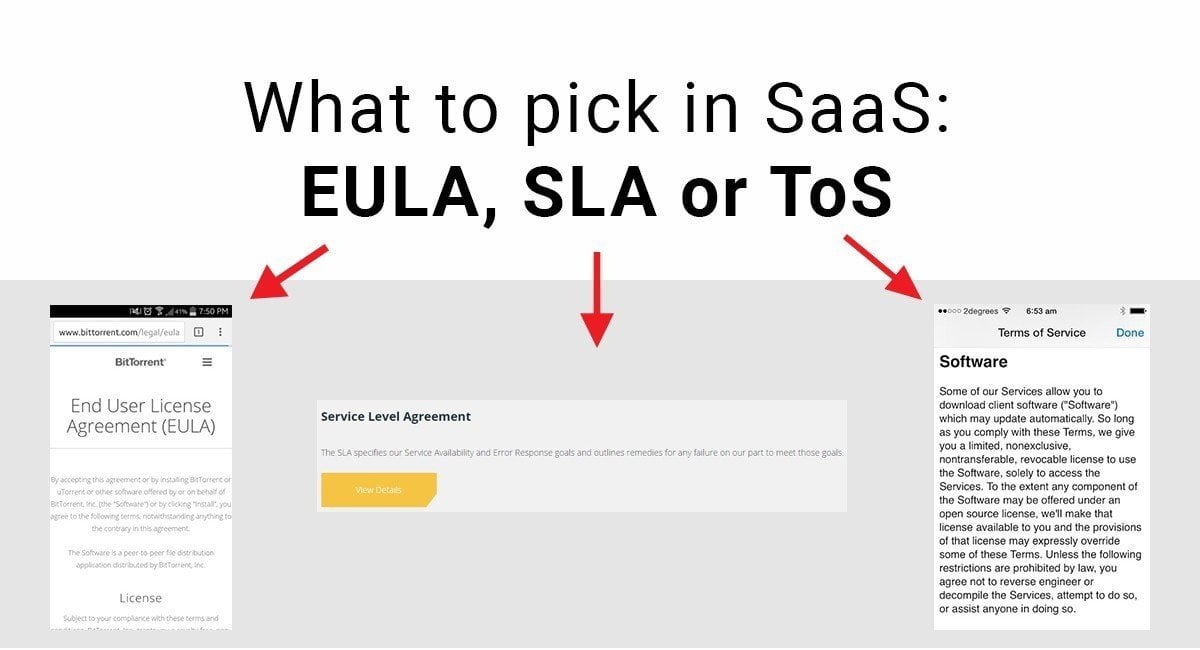
Software-as-a-Service (SaaS) is becoming more widely used and service-based offerings are becoming the new normal for vendors. But the legal agreements involved for new businesses operating SaaS apps are still confusing for many people. Should you use a Terms of Service (ToS) when you sign up new users? What about an.
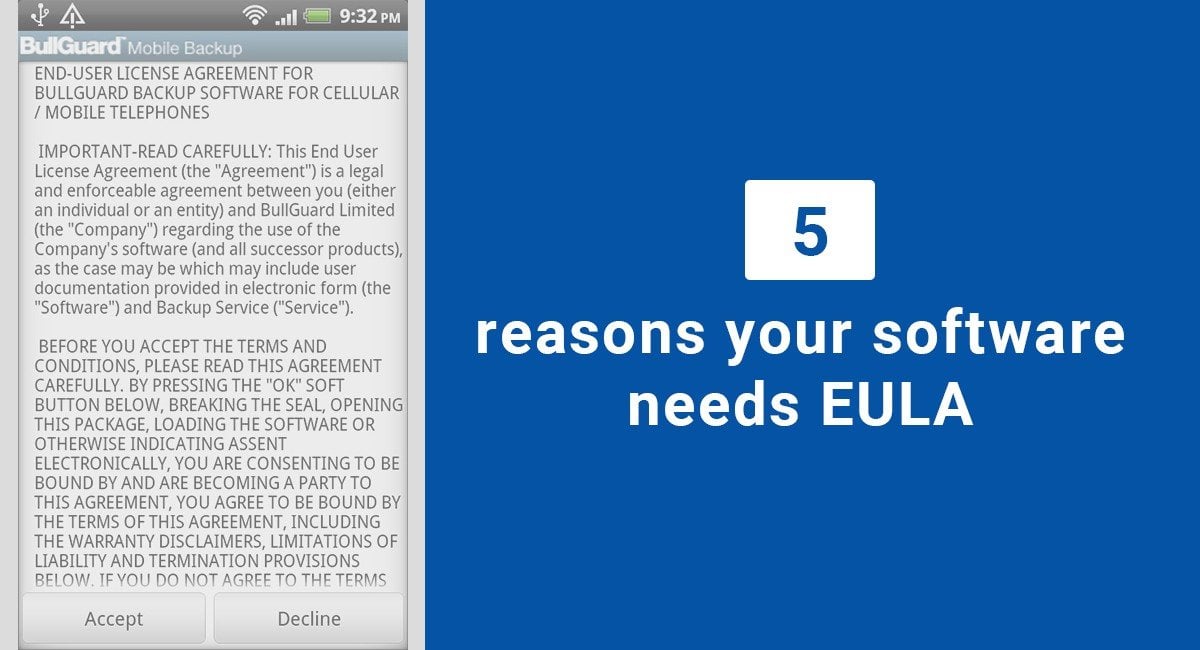
If you develop software applications, an EULA (End-User License Agreement) will be a very important and advantageous legal agreement for you to include with the distribution of your software app. An EULA is essentially a contract between the software developer or publisher (the company creating the application), and the end-user (the.
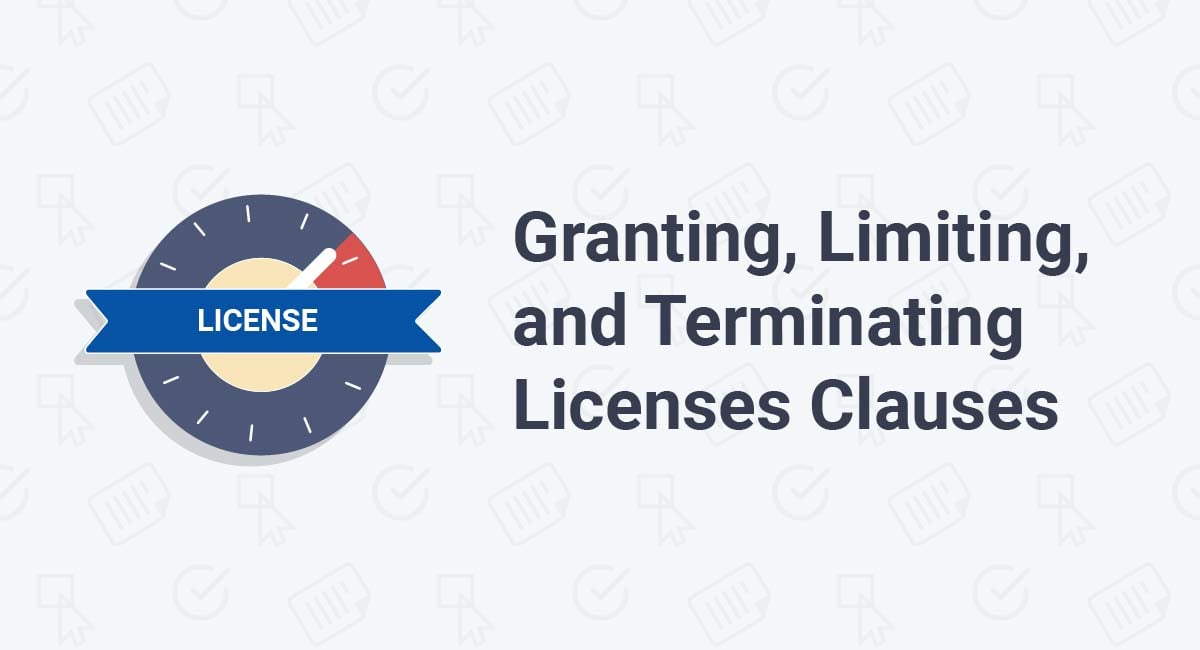
A clause that addresses the granting, limiting, and termination of licenses covers how the license to a product is given, the restrictions on that license, and the conditions and results of terminating the license. For any business that relies on selling licenses in their primary business model (such as a Software-as-a-Service.
Comply with the law with our agreements, policies, tools and cookie consent banners. Everything you need is included.
Disclaimer: Legal information is not legal advice, read the disclaimer. The information provided on this site is not legal advice, does not constitute a lawyer referral service, and no attorney-client or confidential relationship is or will be formed by use of the site.
Copyright © 2012 - 2024 TermsFeed ® . All rights reserved.